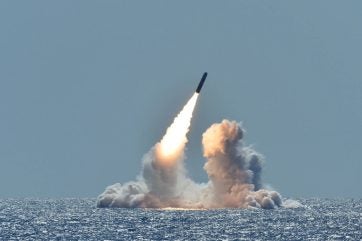
Lockheed Martin Space, based in Titusville, Florida, has been granted a contract worth more than $109m to facilitate the integration of Trident II (D5) missiles and reentry subsystems into the Common Missile Compartment.
The endeavour is part of the ongoing collaboration between the United States and the United Kingdom for their submarine construction programmes.
The contract, awarded by Strategic Systems Programs in Washington, DC, is set to support the US/UK Columbia/Dreadnought class submarine construction programmes.
GlobalData’s intelligence on the US defence market highlights that it’s known that the Columbia class will be armed with conventional torpedo tubes and 16 vertical launch tubes for nuclear-armed Trident D5 ballistic missiles designed to be launched while the submarine is underwater.
It further highlights in a report on the UK’s defence market that the UK’s new Dreadnought submarines will replace the ageing Vanguard fleet that currently houses the UK’s trident missiles.
The UK’s nuclear deterrent faced scrutiny as a Trident missile test conducted by the Royal Navy’s HMS Vanguard submarine failed for the second time in a row, plunging into the Atlantic off Florida’s coast. The mishap, which occurred on January 30, 2024, raises doubts over the effectiveness of the UK’s military readiness. In addition, the costly Trident programme, overseen by Lockheed Martin, now faces increased scrutiny.
In 2023, Lockheed Martin, alongside the Charles Stark Draper Laboratory, clinched contracts totalling $4.4bn aimed at fortifying the Trident II strategic weapon system. The UK also committed over £800m ($1bn) to a service life extension programme for the Trident II D5 intercontinental ballistic missiles (ICBMs).
The integration efforts will be carried out across various locations, with significant portions of the work being performed in Cape Canaveral, Florida, Sunnyvale, California, and Denver, Colorado, among others. The intricate nature of the project underscores the collaborative efforts between the two nations to enhance their maritime defence capabilities.
Under the terms of the contract, Lockheed Martin will be responsible for overseeing the integration process, ensuring compatibility between the Trident II (D5) Missiles and the Common Missile Compartment. The endeavour is expected to complete by February 28, 2029, marking a milestone in advancing the submarine construction programmes.
Funds totalling $80m from the fiscal 2024 shipbuilding and conversion (Navy) budget and $28m from foreign funds (non-foreign military sales) will be allocated for the project. The sole-source nature of the contract, authorised under 10 US Code 2304(c)(1), shows the critical role played by Lockheed Martin in fulfilling the defence requirements of both nations.
Lockheed Martin’s experience in missile integration positions it as a player in advancing US and UK submarine fleet capabilities. The contract signifies a commitment to fostering international partnerships in safeguarding maritime security.
Additional reporting from Alex Blair.







